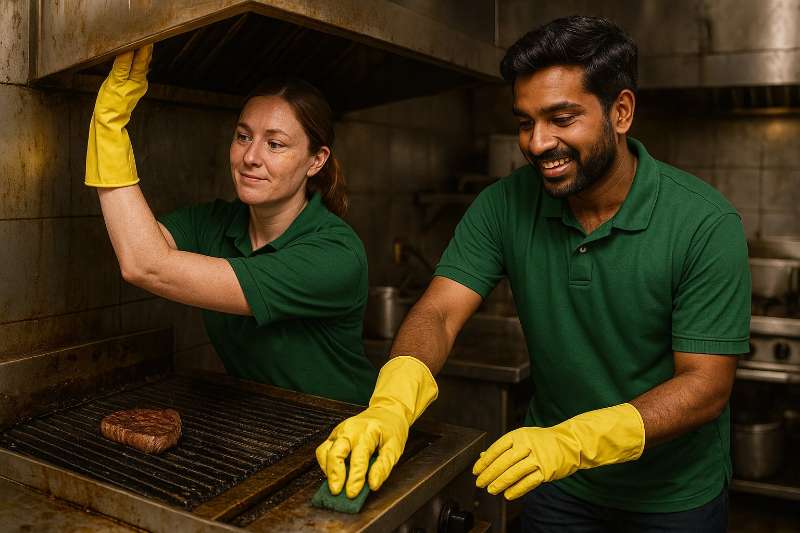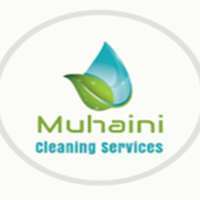Here we will discover the importance of kitchen cleaning in Melbourne for F&B business considering Melbourne's weather, types of kitchen, and key areas to prioritise in a kitchen.
Maintaining a clean kitchen is one of the most crucial aspects of operating a food and beverage business in Melbourne. With a city known for its variable climate from humid summers, cool winters, and unpredictable rain, kitchens face unique hygiene challenges. Moisture and fluctuating temperatures create conditions where bacteria, mould, and odours can develop quickly, especially in commercial kitchens that operate long hours. Cleanliness is not just about appearance, but it also directly affects food quality, staff safety, customer perception, and regulatory compliance.
The Impact of Melbourne’s Climate on Kitchen Hygiene
Melbourne’s weather can shift from warm and humid to cold and damp within days. This variation affects how dirt, grease, and bacteria accumulate in commercial kitchens. During humid months, airborne moisture combines with cooking vapours to form sticky residue on surfaces, vents, and equipment. In cooler months, condensation inside hoods and behind appliances promotes mould and rust, especially on metal surfaces like stainless steel benches and exhaust systems.
Frequent cleaning using pH-neutral detergents and microfiber cloths is essential to counteract these conditions. Regular deep cleaning of vents, exhaust fans, and under-equipment areas prevents the growth of mould and bacteria, keeping the kitchen safe year-round.
Different Kitchens, Different Challenges For Kitchen Cleaning in Melbourne
Each kitchen type presents its own cleaning requirements. Bakeries accumulate fine flour dust and oil residues that cling to mixers, trays, and racks, requiring consistent vacuuming and sanitisation to prevent mould and pests.
Grill and steak restaurants face heavy grease build-up from open-flame cooking, demanding regular hood, duct, and floor degreasing to prevent fire hazards.
Seafood kitchens deal with strong odours and organic residue that can quickly contaminate preparation areas if not disinfected daily.
Chinese and Asian kitchens, where woks and high-heat stir-frying are common, often struggle with thick oil layers that cling to ceilings, exhaust filters, and tiled walls.
Key Areas to Prioritise During Kitchen Cleaning in Melbourne
Certain parts of a commercial kitchen accumulate grease, grime, and bacteria faster than others, particularly in busy Melbourne F&B operations where equipment runs for long hours. This is one of the tougher challenges for kitchen cleaning in Melbourne. Cooking appliances such as stovetops, ovens, fryers, and grills trap layers of oil and carbon that build up over time. If left untreated, these deposits not only affect food flavour but also restrict airflow and pose fire hazards.
The exhaust system is another critical area to prioritise during kitchen cleaning in Melbourne. Grease collects inside hoods and ducts, hardening into flammable residue that can spread quickly if a fire occurs. Regular professional cleaning prevents this risk while keeping ventilation efficient and odour-free.
Floors and drains also require special attention. Constant spills and washing create slick, bacteria-prone surfaces, particularly in drain corners and under refrigeration units where moisture lingers. Without frequent sanitation, these areas can develop slippery films and persistent odours.
Preparation zones demand the same level of care to prioritise during kitchen cleaning in Melbourne. Stainless steel benches, chopping boards, and utensils come into direct contact with food and must be sanitised multiple times a day to stop cross-contamination.
Storage areas, shelving, and cold rooms can trap condensation, encouraging mould growth and unpleasant smells. When neglected, these hidden spots undermine hygiene standards even if visible surfaces appear clean.
Effective kitchen cleaning focuses on these problem zones, combining surface sanitation with deeper, scheduled maintenance to sustain both safety and compliance.
The Role of Professional Kitchen Cleaning in Melbourne
Professional kitchen cleaning in Melbourne services go beyond surface wiping. They involve a structured approach that targets the unique challenges of different kitchen environments. The process typically includes degreasing, sanitising, descaling, and polishing of high-contact surfaces to maintain hygiene and extend equipment life.
While daily cleaning by staff handles surface hygiene, only professional cleaning can eliminate deep-seated residue and bacteria. Certified cleaners use food-safe products and specialised tools and methods like steam cleaners, pH-neutral degreasers, sanitising agents, and scrapers designed for commercial kitchen materials. This prevents damage to stainless steel, aluminium, and tile surfaces while achieving thorough sanitisation.
The goal is to restore a kitchen’s cleanliness to a food-safe standard, keeping operations compliant with Melbourne’s hygiene regulations, reducing the likelihood of fines or reputational harm during inspections. and ensuring both efficiency and safety in high-demand food businesses. More importantly, routine professional cleaning extends the lifespan of expensive kitchen equipment, saving costs over time.
Health and Hygiene Benefits of Kitchen Cleaning for F&B Businesses
A clean kitchen is a fundamental requirement for any food establishment to meet health regulations. In Melbourne, food safety authorities inspect restaurants and cafés regularly, assessing cleanliness as part of compliance. Beyond avoiding penalties, maintaining a hygienic kitchen directly protects customers and staff.
Proper sanitation reduces the risk of cross-contamination, pest infestations, and foodborne illnesses caused by bacteria such as Salmonella and Listeria. For restaurants, bakeries, and catering facilities, professional cleaning of cooking stations, ovens, and preparation benches prevents residue buildup and improves food quality. Clean environments also boost staff morale and are more efficient and comfortable in hygienic spaces.
Long-Term Business Benefits of Kitchen Cleaning in Melbourne
Investing in regular kitchen cleaning in Melbourne builds long-term value for F&B operators. Customers notice clean environments—both in visible spaces and in how their meals are prepared. Clean kitchens improve operational efficiency by preventing breakdowns and maintaining ventilation systems. Over time, businesses benefit from fewer maintenance issues, better inspection scores, and improved trust from diners.
For Melbourne’s competitive F&B market, where reputation can make or break a brand, maintaining a spotless kitchen reinforces professionalism and reliability.
With a structured cleaning process that meets local food safety requirements, Muhaini Cleaning Services helps businesses stay compliant while protecting staff and customers. Regular service scheduling keeps operations efficient, reduces equipment wear, and upholds your venue’s professional image.
For consistent, high-quality results, Muhaini Cleaning Services is your go-to professional for kitchen cleaning in Melbourne. Contact the team to schedule a cleaning program that fits your business’s operational needs and maintains hygiene excellence across every service area.
Conclusion
Maintaining kitchen hygiene in Melbourne’s food and beverage industry involves more than daily cleaning and definitely needs help from professional service of kitchen cleaning in Melbourne. The city’s shifting climate from humid summers to damp winters, creates conditions where grease, bacteria, and mould thrive, making consistent maintenance essential. Different kitchens, from bakeries to seafood and grill restaurants, each face unique cleaning challenges that demand tailored techniques. Targeting critical areas such as exhaust hoods, cooking appliances, floors, drains, and preparation surfaces ensures long-term safety and compliance.
Professional kitchen cleaning delivers a higher standard of hygiene by removing deep-seated residue, using food-safe products and specialised tools that protect stainless steel and aluminium surfaces. Beyond compliance, proper sanitation reduces health risks, improves air quality, and enhances operational efficiency. Over time, a clean kitchen becomes a business asset that helps strengthen reputation, reduce maintenance costs, and ensure smooth daily operations across Melbourne’s competitive F&B landscape.



































